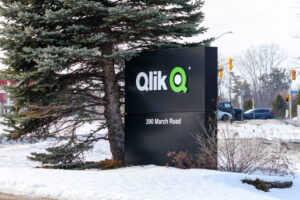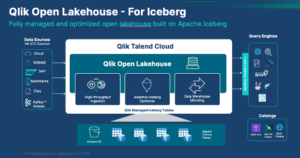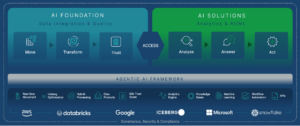
Shutterstock
Data analytics company Qlik unveiled two major product innovations at Qlik Connect 2025 in Orlando, FL. The company launched Qlik Open Lakehouse, a fully managed Apache Iceberg solution embedded into Qlik Talend Cloud. It also introduced a new agentic AI experience that provides a conversational interface, allowing users across the enterprise to easily interact with data.
These new capabilities reflect Qlik’s evolution from a traditional analytics vendor to a full-stack platform capable of handling modern AI workloads. While competitors such as Snowflake and Databricks are keen to unify data and AI workflows, Qlik is more focused on conversational AI agents and interoperable architectures.
While enterprises continue to invest in AI, they are becoming more mindful of the returns their AI initiatives generate. However, bottlenecks like rigid data warehouses and siloed analytic tools are limiting their ability to fully leverage AI’s potential.
Qlik’s Open Lakehouse enables enterprises to scale faster and spend less. The company claims that the new platform delivers 2.5x–5x faster query performance and up to 50% lower infrastructure costs compared to traditional warehouses. It achieves this without compromising on its compatibility with the most widely used analytics and machine learning (ML) engines.
“Performance and cost should no longer be a tradeoff in modern data architectures,” said Mike Capone, CEO of Qlik. “With Qlik Open Lakehouse, enterprises gain real-time scale, full control over their data, and the freedom to choose the tools that work best for them. We built this to meet the demands of AI and analytics at enterprise scale — without compromise.”
A key feature is its real-time ingestion, which allows enterprises to pull millions of records per second from cloud apps, SaaS platforms, SAP, and mainframes, ensuring low-latency access to fresh data. The always-on adaptive optimizer automates Iceberg table maintenance. It can handle compaction, clustering, and pruning without manual tuning.
Qlik is keen on open standards and interoperability, and that is evident with Open Lakehouse. The platform supports direct access across Snowflake, Amazon Athena, Trino, Spark, and SageMaker. Enterprises can work with their preferred data engines without the need to reprocess or move data to a new platform.
Customers can run Qlik Open Lakehouse within their own AWS environments using Bring Your Own Compute (BYOC), giving them direct control over data processing, security settings, and infrastructure costs. This means enterprises decide how their workloads run, manage performance based on their specific needs, and avoid vendor lock-in.
David Navarro, Data Domain Architect at Toyota Motor Europe, said the company is closely following Qlik’s progress: “Large corporations like ours urgently need interoperability between diverse business units and partners, each managing its own technology stack and data sovereignty. Apache Iceberg is emerging as the key to zero-copy data sharing across vendor-independent lakehouses, and Qlik’s commitment to delivering performance and control in these complex, dynamic landscapes is precisely what the industry requires.”
Qlik has spent years refining how businesses interact with data. At its core has been the Qlik engine, which is designed to map relationships across data. It allows users to uncover insights that may otherwise go unnoticed. The new agentic experience builds directly on this engine. It enables both users and AI agents to explore these data relationships more dynamically. Users can ask questions in natural language, uncover patterns, and trigger automated actions.
The new Discovery Agent is built to proactively highlight risks and opportunities so enterprises can stay ahead of emerging trends before they even become a threat or an advantage. Qlik Answers, which was introduced last year for unstructured data, gets an upgrade. It can now bring together structured and unstructured data in a single natural language experience, delivering more comprehensive answers and enabling automated actions.
Qlik is also exploring a new kind of AI agent called the Pipeline Agent, which can help users build data pipelines by simply describing what they want to achieve in plain language. This isn’t a new concept. Microsoft, Databricks, and Snowflake have begun introducing similar tools through their GenAI tools. However, Qlik has more ambitious goals as it aims to offer tighter integration according to the full stack, enabling end-to-end pipeline creation from business intent to execution.
“This new agentic experience is about removing the distance between data, decisions, and outcomes,” said Mike Capone, CEO of Qlik. “People want a seamless, conversational way to engage with their data—one that fits naturally into their work and delivers clear, trusted answers in context. We’ve built this experience to reflect how decisions actually get made in a business.”
Qlik Open Lakehouse is available now in private preview. It is scheduled to be generally available in July 2025. The Qlik agentic experience is scheduled to begin rolling out this summer, starting with private previews.
Related Items
Qlik Completes Acquisition of Talend
Cloudera Unveils Next Phase Of Open Data Lakehouse To Unlock Enterprise AI
Onehouse Manages Lakehouse Workloads Across Clouds, Query Engines, and Table Formats




